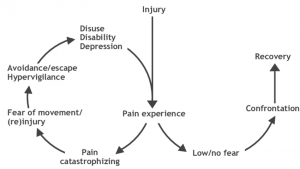
“Postoperative psychosocial Predictors of Poor Outcomes after a Knee Arthroplasty” is a prospective cohort study aimed to investigate the predictive value of postoperative psychosocial factors such as pain catastrophizing, pain-related fear of movement, anxiety, depression and pain attitudes on mid-term postoperative outcomes of physical performance, health functioning, quality of life and pain intensity. The identification of modifiable risk factors for poor outcomes after a knee arthroplasty is a fundamental step in designing perioperative interventions to improve patient outcomes. During the last decade, it has become evident that pain-related psychological factors increase the risk of poor outcomes. Still, there is little evidence regarding their influence when assessed postoperatively. Other researchers of the group involved are Mirari Ochandorena-Acha.
This project has been funded by The Catalan Board of Physiotherapists.
RELATED PAPERS, STUDIES, OUTPUTS
Assessment of postoperative health functioning after knee arthroplasty in relation to pain catastrophizing: a 6-month follow-up cohort study. (https://pubmed.ncbi.nlm.nih.gov/32974103/)
Postoperative psychosocial factors in health functioning and health-related quality of life after knee arthroplasty: a 6-month follow-up observational study (Pain Medicine – Accepted Paper) (https://www.researchgate.net/publication/349060919_Postoperative_psychosocial_factors_in_health_functioning_and_health-related_quality_of_life_after_knee_arthroplasty_A_6-month_follow_up_prospective_observational_study)
The influence of postoperative pain catastrophizing on knee arthroplasty outcomes: a prospective cohort study (https://www.researchgate.net/publication/343750081_The_influence_of_postoperative_pain_catastrophism_on_knee_arthroplasty_outcomes_a_prospective_cohort_study)
CONTACT
Marc Terradas-Monllor: marc.terradas@uvic.cat

